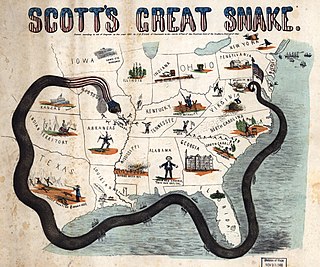 W
WThe Anaconda Plan is the name applied to a Union Army outline strategy for suppressing the Confederacy at the beginning of the American Civil War. Proposed by Union General-in-Chief Winfield Scott, the plan emphasized a Union blockade of the Southern ports and called for an advance down the Mississippi River to cut the South in two. Because the blockade would be rather passive, it was widely derided by a vociferous faction of Union generals who wanted a more vigorous prosecution of the war and likened it to the coils of an anaconda suffocating its victim. The snake image caught on, giving the proposal its popular name.
 W
WAn animal epithet is a name used to label a person or group, by association with some perceived quality of an animal. Epithets may be formulated as similes, explicitly comparing people with the named animal, or as metaphors, directly naming people as animals. Animal epithets may be pejorative, readily giving offence, and they are sometimes used in political campaigns. One English epithet, lamb, is always used positively.
 W
WIn male gay culture, a bear is often a larger or obese hairier man who projects an image of rugged masculinity. Bears are one of the many LGBT communities with events, codes, and a culture-specific identity. However, in San Francisco during the 1970s, any hairy man of whatever shape was referred to as a 'bear' until the term was appropriated by larger men, and other words had to be used to describe hairy other-shaped men such as otter (slim), cub, or wolf. The word manatee describes a big, hairless man, i.e., a bear without hair.
 W
W"Belling the Cat" is a fable also known under the titles "The Bell and the Cat" and "The Mice in Council". Although often attributed to Aesop, it was not recorded before the Middle Ages and has been confused with the quite different fable of Classical origin titled The Cat and the Mice. In the classificatory system established for the fables by B. E. Perry, it is numbered 613, which is reserved for Mediaeval attributions outside the Aesopic canon.
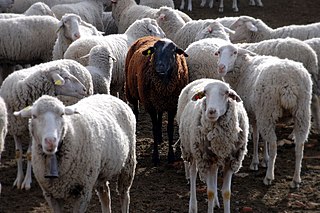 W
WIn the English language, black sheep is an idiom used to describe an odd or disreputable member of a group, especially within a family. The term stems from sheep whose fleece is colored black rather than the more common white; these sheep stand out in the flock and their wool was traditionally considered less valuable as it was not able to be dyed.
 W
WThe black swan theory or theory of black swan events is a metaphor that describes an event that comes as a surprise, has a major effect, and is often inappropriately rationalised after the fact with the benefit of hindsight. The term is based on an ancient saying that presumed black swans did not exist – a saying that became reinterpreted to teach a different lesson after the first European encounter with them.
 W
WThe boiling frog is a fable describing a frog being slowly boiled alive. The premise is that if a frog is put suddenly into boiling water, it will jump out, but if the frog is put in tepid water which is then brought to a boil slowly, it will not perceive the danger and will be cooked to death. The story is often used as a metaphor for the inability or unwillingness of people to react to or be aware of sinister threats that arise gradually rather than suddenly.
 W
WBoll weevils was an American political term used in the mid- and late-20th century to describe conservative Southern Democrats.
 W
WA bull is a stock market speculator who buys a holding in a stock in the expectation that in the very short-term it will rise in value whereupon they will sell the stock to make a quick profit on the transaction. Strictly speaking the term applies to speculators who borrow money to fund such a purchase, and are thus under great pressure to complete the transaction before the loan is repayable or the seller of the stock demands payment on settlement day for delivery of the bargain. If the value of the stock falls contrary to their expectation, a bull suffers a loss, frequently very large if they are trading on margin. A bull has a great incentive to "talk-up" the value of their stock or to manipulate the market in their stock, for example by spreading false rumour, to procure a buyer or to cause a temporary price increase which will provide them with the selling opportunity and profit they require. A bull must therefore be contrasted with an investor, who purchases a stock in expectation of a medium-term or long-term increase in value due to the underlying performance of the company and its assets. The speculator who takes a directly opposite view to the bull is the bear, who speculates on a stock decreasing in value, having sold short. A bull market is a period during which stock market prices rise over a sustained period, therefore to the advantage of bulls.
 W
WButterfly Economics: A New General Theory of Social and Economic Behavior is a book by Paul Ormerod dealing with economic theory, published in 1998. The author uses a plethora of insect-related metaphors to show that an economy tends to function like a living organism and is thus able to learn and to adapt.
 W
WCash cow, in business jargon, is a venture that generates a steady return of profits that far exceed the outlay of cash required to acquire or start it. Many businesses attempt to create or acquire such ventures, since they can be used to boost a company's overall income and to support less profitable endeavors.
 W
WCougar is slang for a woman who seeks sexual activity with significantly younger men.
 W
WCrab mentality, also known as crab theory, crabs in a bucket mentality, or the crab-bucket effect, is a way of thinking best described by the phrase "if I can't have it, neither can you". The metaphor is derived from a pattern of behavior noted in crabs when they are trapped in a bucket. While any one crab could easily escape, its efforts will be undermined by others, ensuring the group's collective demise.
 W
WThe dogs of war is a phrase spoken by Mark Antony in Act 3, Scene 1, line 273 of English playwright William Shakespeare's Julius Caesar: "Cry 'Havoc!', and let slip the dogs of war."
 W
WDragon king (DK) is a double metaphor for an event that is both extremely large in size or impact and born of unique origins relative to its peers. DK events are generated by or correspond to mechanisms such as positive feedback, tipping points, bifurcations, and phase transitions, that tend to occur in nonlinear and complex systems, and serve to amplify DK events to extreme levels. By understanding and monitoring these dynamics, some predictability of such events may be obtained.
 W
WThe term "eye of a needle" is used as a metaphor for a very narrow opening. It occurs several times throughout the Talmud. The New Testament quotes Jesus as saying that "it is easier for a camel to go through the eye of a needle than for a rich man to enter the kingdom of God". It also appears in the Qur'an 7:40, "Indeed, those who deny Our verses and are arrogant toward them - the gates of Heaven will not be opened for them, nor will they enter Paradise until a camel enters into the eye of a needle. And thus do We recompense the criminals."
 W
WFatted calf is a metaphor or symbol of festive celebration and rejoicing for someone's long-awaited return. It derives from the Parable of the Prodigal Son in the New Testament. In biblical times, people would often keep at least one piece of livestock that was fed a special diet to fatten it up, thus making it more flavorsome when prepared as a meal. Slaughtering this livestock was to be done on rare and special occasions. Thus when the prodigal son returns, the father "kills the fatted calf" to show that the celebration is out of the ordinary.
 W
WFlogging a dead horse is an idiom that means a particular effort is a waste of time as there will be no outcome, such as in the example of flogging a dead horse, which will not cause it to do any useful work.
 W
WThe Four Asian Tigers are the economies of South Korea, Taiwan, Singapore and Hong Kong. Between the early 1960s and 1990s, they underwent rapid industrialization and maintained exceptionally high growth rates of more than 7 percent a year.
 W
WHomo homini lupus, or in its unabridged form Homo homini lupus est, is a Latin proverb meaning "A man is a wolf to another man," or more tersely "Man is wolf to man." It has meaning in reference to situations where people are known to have behaved in a way comparably in nature to a wolf. The wolf as a creature is thought, in this example, to have qualities of being predatory, cruel, inhuman i.e. more like an animal than civilized.
 W
WThe infinite monkey theorem states that a monkey hitting keys at random on a typewriter keyboard for an infinite amount of time will almost surely type any given text, such as the complete works of William Shakespeare. In fact, the monkey would almost surely type every possible finite text an infinite number of times. However, the probability that monkeys filling the entire observable universe would type a single complete work, such as Shakespeare's Hamlet, is so tiny that the chance of it occurring during a period of time hundreds of thousands of orders of magnitude longer than the age of the universe is extremely low.
Jumping the shark is an idiom used to describe a moment when something that was once widely popular, but has since grown less popular, makes a misguided attempt at generating publicity that instead only serves to highlight its irrelevance. This is especially applicable to television series or other entertainment outlets. The phrase derives from a 1977 episode of the sitcom Happy Days (1974–1984), in which the character Fonzie jumps over a shark while on water-skis. This gimmick strayed absurdly outside the original storyline of the sitcom.
 W
WKangaroo care also called skin-to-skin contact, is a technique of newborn care where babies are kept chest-to-chest and skin-to-skin with a parent, typically their mother.
 W
WA kangaroo court is a court that ignores recognized standards of law or justice and often carries little or no official standing in the territory within which it resides. A kangaroo court may ignore due process and come to a predetermined conclusion. The term may also apply to a court held by a legitimate judicial authority which intentionally disregards the court's legal or ethical obligations.
 W
WLamb of God is a title for Jesus that appears in the Gospel of John. It appears at John 1:29, where John the Baptist sees Jesus and exclaims, "Behold the Lamb of God who takes away the sin of the world." It appears again in John 1:36.
 W
WA lone wolf is an animal or person that acts independently or generally lives or spends time alone instead of with a group. The term originates from wolf behavior. Normally a pack animal, wolves that have left or been excluded from their pack are described as lone wolves. A human lone wolf is an individual who acts independently and prefers to do things on their own, prefers solitude, expresses introversion, or works alone. Synonyms include individualist, free spirit, and 'nonconformist'. In literature, lone wolves are often aloof and emotionally unable or unwilling to directly interact with other characters in the story. A stereotypical lone wolf will be dark or serious in personality; they are often taciturn and distinguished by their reserved nature.
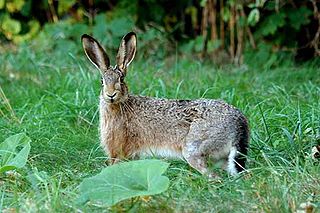 W
WTo be as "mad as a March hare" is an English idiomatic phrase derived from the observed antics, said to occur only in the March breeding season of the European hare, Lepus europaeus. The phrase is an allusion that can be used to refer to any other animal or human who behaves in the excitable and unpredictable manner of a "March hare".
 W
WMama grizzly is a term that former U.S. vice presidential candidate and Alaska governor Sarah Palin coined to refer to herself that has since been applied to female candidates she supported or endorsed in the 2010 U.S. midterm elections. Palin first used the term in a May 2010 speech at a fundraiser for the Susan B. Anthony List, a pro-life women's group, and used it in a July 2010 YouTube video produced by SarahPAC, Palin's political action committee, for the 2010 elections. The persona largely served as a device by which Palin could "blend [her] feminine and masculine qualities and capabilities." By September 2010, mama grizzly was deemed to be "part of the lexicon" of the election by Newsweek magazine. It has never been made clear if the term is meant to refer to all women candidates supported by the former governor, or if it is just a general concept about real-life moms entering politics because they fear for their children's future.
 W
WMonkey see, monkey do is a pidgin-style saying that appeared in American culture in the early 1920s. The saying refers to the learning of a process without an understanding of why it works. Another definition implies the act of imitation, usually with limited knowledge and/or concern for the consequences.
 W
WThe Pacific Pumas are a political and economic grouping of countries along Latin America’s Pacific coast that includes Chile, Colombia, Mexico and Peru. The term references the four larger Pacific Latin American emerging markets that share common trends of positive growth, stable macroeconomic foundations, improved governance and an openness to global integration.
 W
WThe Parable of the Lost Sheep is one of the parables of Jesus. It appears in the Gospels of Matthew and Luke. It is about a shepherd who leaves his flock of ninety-nine sheep in order to find the one which is lost. It is the first member of a trilogy about redemption that Jesus tells after the Pharisees and religious leaders accuse him of welcoming and eating with "sinners." The two parables that follow are those of the Lost Coin and the Prodigal Son. The parable of the Good shepherd, a pericope found in John 10:1–21, derives from it Matthew.
 W
WPost turtle is a phrase that has been used in political discourse of various countries, particularly in North America, based on an old joke. Various politicians have been referenced by the joke or used the joke, including Bill Clinton, George W Bush, Barack Obama, and Donald Trump.
 W
WThe English idiom "it is raining cats and dogs", used to describe particularly heavy rain, is of unknown etymology and is not necessarily related to the raining animals phenomenon. The phrase has been used at least since the 17th century. A number of possible etymologies have been put forward to explain the phrase; for example:Drainage systems on buildings in 17th-century Europe were poor and may have disgorged their contents during heavy showers, including the corpses of any animals that had accumulated in them. This occurrence is documented in Jonathan Swift's 1710 poem "Description of a City Shower", in which he describes "Drowned puppies, stinking sprats, all drenched in mud,/Dead cats and turnip-tops come tumbling down the flood." "Cats and dogs" may be a corruption of the Greek word Katadoupoi, referring to the waterfalls on the Nile, possibly through the old French word catadupe ("waterfall"). In old English, catadupe meant a cataract or waterfall. "Cats and dogs" may come from the Greek expression cata doxa, which means “contrary to experience or belief,” but there is no evidence to support the theory that it was borrowed by English speakers. If it is raining cats and dogs, it is raining unusually or unbelievably hard.
 W
WA rat race is an endless, self-defeating, or pointless pursuit. The phrase equates humans to rats attempting to earn a reward such as cheese, in vain. It may also refer to a competitive struggle to get ahead financially or routinely.
 W
WA red herring is something that misleads or distracts from a relevant or important question. It may be either a logical fallacy or a literary device that leads readers or audiences toward a false conclusion. A red herring may be used intentionally, as in mystery fiction or as part of rhetorical strategies, or may be used in argumentation inadvertently.
 W
WA sacrificial lamb is a metaphorical reference to a person or animal sacrificed for the common good. The term is derived from the traditions of Abrahamic religion where a lamb is a highly valued possession.
 W
WIn the Bible, a scapegoat is one of two kid goats. As a pair, one goat was sacrificed and the living “scapegoat” was released into the wilderness, taking with it all sins and impurities. The concept first appears in Leviticus, in which a goat is designated to be cast into the desert to carry away the sins of the community.Then Aaron shall lay both his hands on the head of the live goat, and confess over it all the iniquities of the people of Israel, and all their transgressions, all their sins, putting them on the head of the goat, and sending it away into the wilderness by means of someone designated for the task. The goat shall bear on itself all their iniquities to a barren region; and the goat shall be set free in the wilderness.
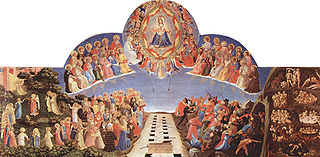 W
WThe Sheep and the Goats or "the Judgment of the Nations" is a pronouncement of Jesus recorded in chapter 25 of the Gospel of Matthew, although unlike most parables it does not purport to relate a story of events happening to other characters. According to Anglican theologian Charles Ellicott, "we commonly speak of the concluding portion of this chapter as the parable of the Sheep and the Goats, but it is obvious from its very beginning that it passes beyond the region of parable into that of divine realities, and that the sheep and goats form only a subordinate and parenthetic illustration". This portion concludes the section of Matthew's Gospel known as the Olivet Discourse and immediately precedes Matthew's account of Jesus' passion and resurrection.
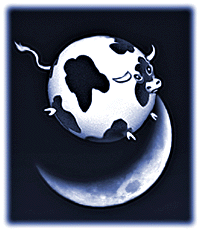 W
WA spherical cow is a humorous metaphor for highly simplified scientific models of complex real life phenomena. The implication is that theoretical physicists will often reduce a problem to the simplest form they can imagine in order to make calculations more feasible, even though such simplification may hinder the model's application to reality.
 W
WThe three wise monkeys are a Japanese pictorial maxim, embodying the proverbial principle "see no evil, hear no evil, speak no evil". The three monkeys areMizaru, who sees no evil, covering his eyes Kikazaru, who hears no evil, covering his ears and Iwazaru, who speaks no evil, covering his mouth.
 W
WTiger Cub Economies collectively refer to the economies of the developing countries of Indonesia, Malaysia, the Philippines, Thailand and Vietnam, the five dominant countries in Southeast Asia.
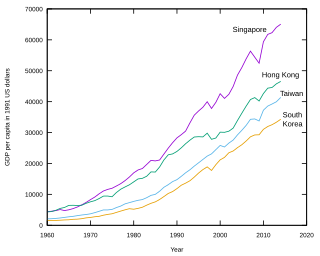 W
WA tiger economy is the economy of a country which undergoes rapid economic growth, usually accompanied by an increase in the standard of living. The term was originally used for the Four Asian Tigers as tigers are important in Asian symbolism, which also inspired the Tiger Cub Economies. The Asian Tigers also inspired other economies later on; the Anatolian Tigers in the 1980s, the Gulf Tiger (Dubai) in the 1990s, the Celtic Tiger in 1995–2000, the Baltic tigers in 2000–2007, and the Tatra Tiger (Slovakia) in 2002–2007.
 W
W"Turtles all the way down" is an expression of the problem of infinite regress. The saying alludes to the mythological idea of a World Turtle that supports the flat earth on its back. It suggests that this turtle rests on the back of an even larger turtle, which itself is part of a column of increasingly large world turtles that continues indefinitely.
 W
W"You have two cows" is a form of political satire on various political, economic, etc. systems. The setup of a typical joke of this kind is the assumption that the listener lives within a given system and has two cows. The punch line is what happens to the listener and the cows in this system.